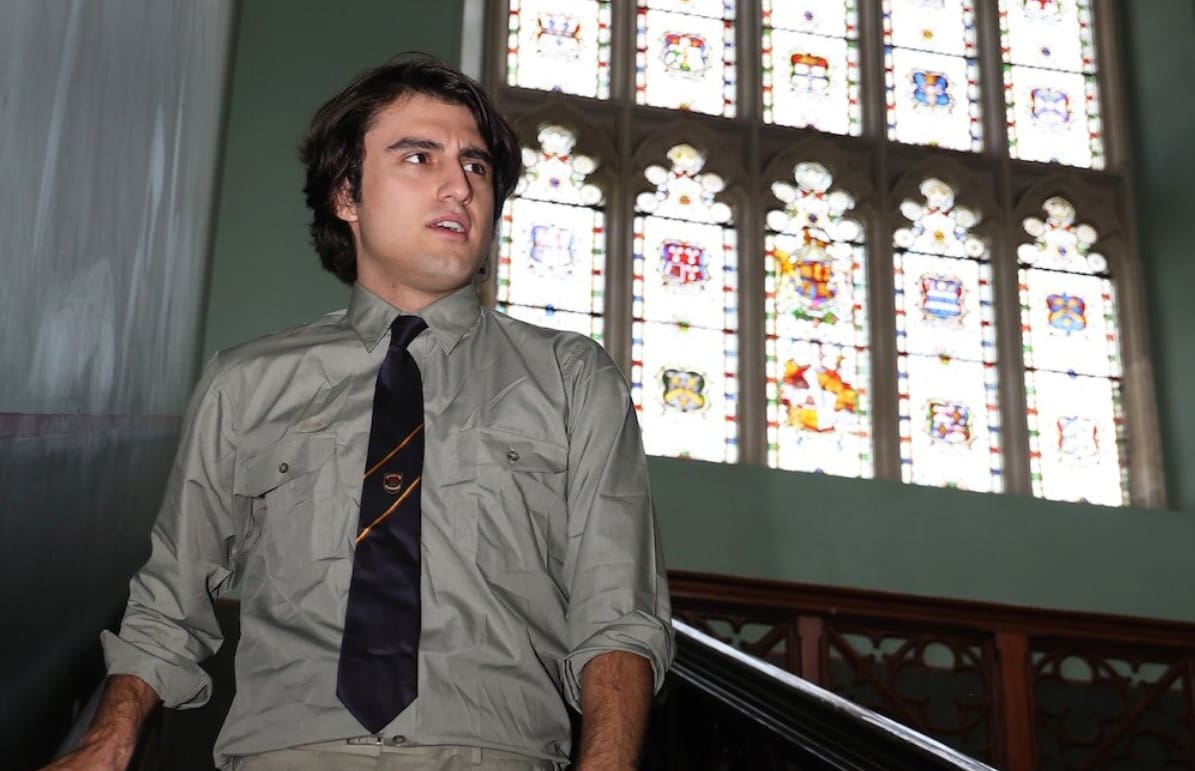Much has been said on the place of private schools in contemporary Australian society. USyd alum William Duke insightfully focuses this conversation onto the individual effects of the ‘all boys’ culture in his debut play, Killing Mr Barber. In it, we follow the openly gay Francis, (portrayed by Duke) as he introduces us to the all boys private school world of ‘Boy Politics’. A quick reference to Joey’s (St. Joseph’s) places fictional ‘Harrow College’ in the pantheon of Sydney’s most privileged all boys schools – the ilk of St Aloysius, Kings, Trinity Grammar and many others.
The comedy of Mr Barber varies between sharp wordplay and solid punchlines. Duke’s characterisation of Francis creates levity through his insightful perspective and the alluring way he delivers gossip. Notably, he satirises the privilege of these places and touches on the dark comedy of how students talk about the history of sex abuse at their schools.
Whilst the character’s voice begins as somewhat unfocused and lackadaisical in which anecdotes he shares — classic teenager storytelling — Duke uses this voice over the course of the show to develop a woven narrative between Francis and the people he gossips about. His stories illustrate his actual social relationships and their power dynamics. The audience laughs along at the cruelty and the gossip as it is slowly revealed to be the protagonist’s attempt at cultivating his likeability.
Francis’ bevy of cruel yet comedic jabs tease out why this form of ‘comedy’ is unsuited for the friendship dynamics of teenagers — it’s funny for us as an audience, but to these children it’s just cruel. The way young men engage in these behaviours ‘as a joke’, is a common excuse for why they’re okay. Killing Mr Barber shows us why they’re not.
As we explore these behaviours, we realise Francis is cruel to fit in. He believes that by adopting the social violence of his peers he will avoid homophobia. We see how when gay men exist in these spaces, they adapt by developing their own versions of male toxicity.
The set (minimal yet effectively used) consists of a single wooden stool, two ‘school assembly’ style speakers, and two diffused spotlights focused on our protagonist.
The spotlights stylistically demonstrate a change in location or mood – most commonly a warm single light as Francis talks privately to us – but a harsh bright white breaks us into the fluorescent lighting of a school assembly or classroom.
As Francis’ confessional develops emotional complexity, the lights take on startling stylisation – contrasting between red and green. We feel the intensity of his feelings. The sparingly used audio for the performance is less successful – whilst each line from ‘other characters’ (delivered by Duke) are still comedic and elicited a barrage of laughter, they seemed to distract from the emotionality of the performance. Luckily, Duke’s body language carried through the audio components and kept them grounded.
‘Saturday night’ is an ongoing thread for us and Francis: unable to remember what happened, he appears to experience the uncertainty and betrayal of being gossiped about. Francis is a character who is lonely, and to the audience he lets us in on moments of sincerity and sadness. Duke has chosen specific characterisations that reinforce this ‘disaffected queer teenager’ – breathing through teeth, hands on knees, thumb in mouth when thinking. Paired with the school uniform, complete with knee high socks and shorts, Duke transforms into a young man who looks like an adult —a commonality at these elite, macho schools. Whilst some verbal choices affected Duke’s line delivery at the beginning, each still came across well and he quickly settled into the characterisation with full audibility.
Francis is introduced to us as a character who is not a traditional ‘Harrovian’, but through his complicity in a culture of casual cruelty and emotional repression he becomes a model student — even though he and his friendships might suffer.
Killing Mr Barber is deeply accurate in its depictions of this malignant culture and how gay men can intersect with it. It called to mind my own experiences as a gay teenager at an all-boys school. In some ways, I believe a younger version of myself would’ve benefitted from seeing this play — and hope that it could be of use to young people in a similar position today.
I’d like to think that these schools have changed since my experiences, or that we could consider Killing Mr. Barber a clever satire of a different time. But the news of Knox Grammar student behaviour as recently as last week casts doubt that these institutions can affect meaningful change. The emotional core of Duke’s performance seems to question this also — in this culture where sincere emotion is abhorred and punished socially, the people and the culture of these places cannot grow.
Killing Mr. Barber is an excellent debut from William Duke, and a solid addition to Sydney Fringe Festival. Whatever comes next for Duke and this production, I’m excited to see it.





